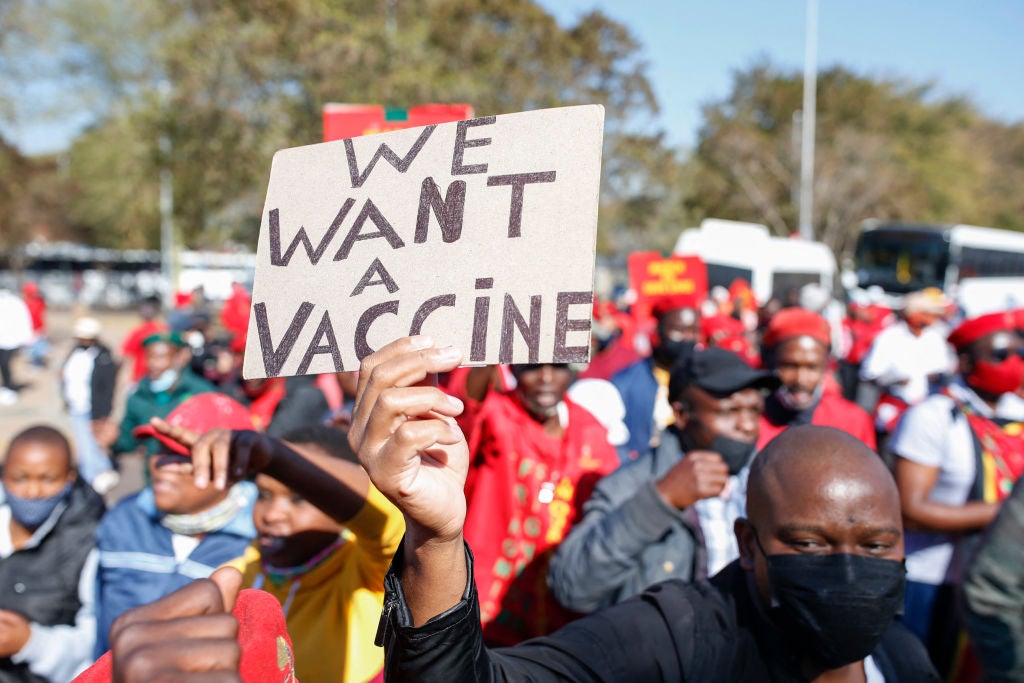Severe disease, not mild infection, makes a pandemic – vaccines still offer our best hope
If the current high levels of protection against severe disease are sustained, the global public health emergency will be curtailed by the ongoing vaccine rollout


Your support helps us to tell the story
From reproductive rights to climate change to Big Tech, The Independent is on the ground when the story is developing. Whether it's investigating the financials of Elon Musk's pro-Trump PAC or producing our latest documentary, 'The A Word', which shines a light on the American women fighting for reproductive rights, we know how important it is to parse out the facts from the messaging.
At such a critical moment in US history, we need reporters on the ground. Your donation allows us to keep sending journalists to speak to both sides of the story.
The Independent is trusted by Americans across the entire political spectrum. And unlike many other quality news outlets, we choose not to lock Americans out of our reporting and analysis with paywalls. We believe quality journalism should be available to everyone, paid for by those who can afford it.
Your support makes all the difference.Following “freedom day” and the relaxing of social distancing and mask-wearing rules, in the face of our third coronavirus wave, there is some trepidation.
We know the UK is one of the most highly vaccinated populations in the world with more than 88 per cent of adults receiving at least one dose. And there is a demonstrable weakening of the link between cases and hospitalisations or deaths.
The situation is rather different in South Africa, where the third wave is peaking. In both countries, the third wave is dominated by the Delta variant, but the similarities end there. South Africa is under-vaccinated, with about 5 per cent of adults having received one dose, and the huge third wave has placed horrifying pressures on the health system.
The second wave in South Africa was dominated by the notorious Beta variant, which sparked much concern because of its ability to escape immune responses and cause infections in vaccinated individuals, but it hasn’t taken off here in the UK. Beta has almost completely been pushed out by the Delta variant in the third wave in South Africa, and in other countries, like the UK, where both are present.
So surprisingly, the increasingly rare Beta variant is in the news again. Clement Beaune, the French Europe minister, publicly criticised the restrictions placed upon travellers from France to England by the UK government because of UK fears that the Beta variant, first identified in South Africa, might spread to the UK and that the vaccines would be less effective.
We have been here before.
South Africa was one of the first African countries to procure the Oxford-AstraZeneca vaccine from the Serum Institute of India. Unfortunately, these doses were never deployed because of misguided fears over efficacy, allowing the present third wave to occur in a largely unvaccinated population.
As we see today with the Delta variant, the Beta variant is well adapted to infect those who are vaccinated, and we showed this to be the case in a clinical trial in South Africa, where there was very low efficacy against minor infections. This is not a reason to panic. Infection of vaccinated people with Beta, Delta, and future coronavirus variants is expected. It is a severe disease and not mild infection that makes a pandemic, and so far vaccines have substantially weakened the link between infection and death.
The available studies of the Oxford-AstraZeneca vaccine only tell us about mild infection with Beta as severe disease has not been studied. The absence of direct evidence of protection against severe disease caused by Beta is not the same as the absence of protection.
On the contrary, taking data together from the laboratory, animal studies, and trials of other similar vaccines we can be confident that the Oxford vaccine will be highly effective at preventing severe disease and death with Beta, just as it does with Alpha and Delta variants.
Future policy decisions should be driven by the effectiveness of vaccines against hospitalisation and death. If the current high levels of protection against severe disease are sustained, the global public health emergency will be curtailed by the ongoing vaccine rollout.
The confused messaging about Beta variants and vaccine effectiveness undermines our best tool for preventing death from Covid-19: the vaccines.
Professor Sir Andrew Pollard is director of the Oxford Vaccine Group at the University of Oxford
Shabir Madhi is professor of Vaccinology at the University of Witwatersrand

Join our commenting forum
Join thought-provoking conversations, follow other Independent readers and see their replies
Comments